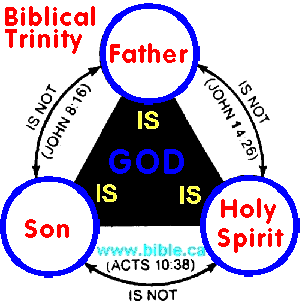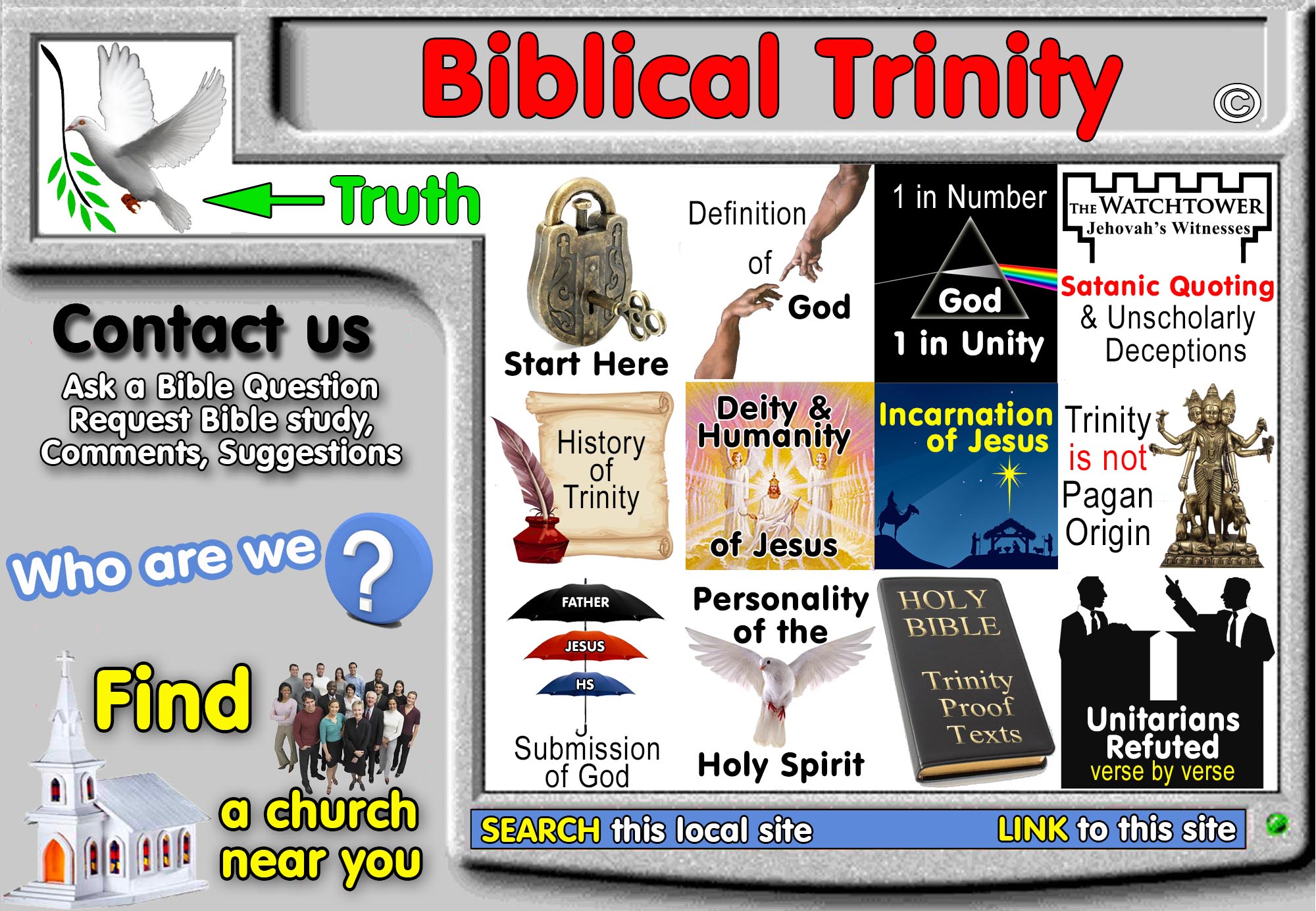Non-triadic passages that interweave fellowship, love joy and sanctification, indwells. It is obvious that all three are persons!
|
|
|
|
Anti-Trinitarian rebuttal #1 |
"There is only one God mentioned in the verse not three. Even if the Holy Spirit is a person, there is a clear distinction between the three persons. |
|
Anti-Trinitarian rebuttal refuted |
We agree. Only Modalists believe there is no distinction between the three and that they are one person. All we need to do is prove that the Holy Spirit is a person from this verse. Since all anti-Trinitarians deny that the Holy Spirit is a person, trinity doctrine is proven by default. There is no in-between position: If the Holy Spirit is a person, then Trinitarians are right, if a thing, then Trinitarians are wrong. |
|
|
|
|
Anti-Trinitarian rebuttal #2 |
Christians share in the Holy Spirit, in the same way they would share a pizza, that is all the verse is saying. When 4 people "have fellowship" with a pizza, we know the difference between persons and things! Persons may "share" or "fellowship" faith, blood, sufferings, water, food or a source of energy (Holy Spirit) without such things being persons as is seen in these verses that use the same Greek word for fellowship/sharing in 2 Cor 13:14:
- Philemon 6: "the sharing of your faith"
- 1 Corinthians 10:16 "a sharing in the blood of Christ"
- 2 Corinthians 8:4 "the favor of participation in the support of the saints"
- Phil 3:10 "the fellowship of His sufferings"
- 2 Cor 13:14 "the fellowship of the Holy Spirit"
|
|
Anti-Trinitarian rebuttal refuted |
The way anti-Trinitarians water down the meaning of words, you would think that the Greek word for fellowship/sharing in 2 Cor 13:14 never means a companionship or brotherhood between persons. Yet in many places like Gal 2:9 this is exactly what it means, "James, Cephas and John ... gave to me and Barnabas the right hand of fellowship". Further, remember that the exact same expressions are used of the Father, Son and Holy Spirit. For example, 1 Cor 1:9 says, "God is faithful, through whom you were called into fellowship with His Son, Jesus Christ our Lord." The Greek in 1 Cor 1:9 is identical to that of 2 Cor 13:14.
So anti-Trinitarians must admit that our interpretation, although they think it wrong, is possible and a natural interpretation based upon other verses like Gal 2:9 and 1 Cor 1:9.
Having said the above, we are honest enough to admit that the Greek word for fellowship can mean a sharing between persons through the medium of a thing. A Christian sharing with a non-Christian his faith. Christians sharing with one another and Christ the body and blood in the Lord's supper. Rich Christians sharing with poor Christians their money. Christians sharing with Christ the same kind of sufferings. But does this mean that 2 Cor 13:14 is saying that Christians share with one another, the Holy Spirit? We ask the simple question: How do Christians share the Holy Spirit? Do Christians share a common energy supplied by the Holy Spirit like they would from a pizza? Is this what the verse is saying? No! |
|
|
|
|
Anti-Trinitarian rebuttal #3 |
New World Translation used by Jehovah's Witnesses, renders the verse, "The undeserved kindness of the Lord Jesus Christ and the love of God and the sharing in the holy spirit be with all of you." This verse tells us about the sharing in the holy spirit, and says nothing about the holy spirit being a person. |
|
Anti-Trinitarian rebuttal refuted |
New World Translation (sectarian paraphrase) violates the integrity of the original Greek. Notice that word "of" connects the first two, but the third is joined by "in". We actually don't really care how Jehovah's Witnesses render the verse as long as the three joining phrases ARE IDENTICAL. This is because they are identical in the Greek. So if they render all three using "in" or "of", we don't care as long as the rule of consistency is obeyed. Of course the correct rendering is by using the word "OF".
These two renderings are acceptable, although the first is correct:
- "Kindness of the Lord, love of God, Fellowship of the Holy Spirit"
- "Kindness in the Lord, love in God, Fellowship in the Holy Spirit"
These two above renderings prove beyond question that all three are persons. "Kindness of the Lord" is the same as "kindness in the Lord". The NWT rendering is unacceptable because it violates the rule of consistency. By this rendering, they are trying to project the false impression that Kindness and love come from the persons of God, but that we have "fellowship and sharing" in the power of the non-personal Holy Spirit. Jehovah's Witnesses just can't leave the Bible alone without twisting it!
The NWT rendering is below violates the rule of consistency:
- "Kindness of the Lord, love of God, Fellowship in the Holy Spirit"
Every major translation renders the three joiners as "of". Only desperate sectarian bias with a need to confuse, would do otherwise. |
|
|
|
|
Anti-Trinitarian rebuttal #4 |
"Others take the latter gen. as a subjective gen. or gen. of quality fellowship brought about by the Holy Spirit (Heinrici, Bachmann, Bousset; TSchmidt, D. Leib Christi '19, 135; s. 4 below)." Bauer-Arndt-Gingrich, page 439 |
|
Anti-Trinitarian rebuttal refuted |
Notice that Bauer-Arndt-Gingrich specifically classifies it as their first choice under the "trinitarian" section, but notice also that they list 1 Cor 1:9 and 2 Cor 13:14 together in both section #1 [1. association, communion, fellowship, close relationship ... fellowship w. the Holy Spirit (so Sickenberger in the Trinitarian sense).] and section #4. [4. participation, sharing tinov" in something].
So B.A.G classifies both 1 Cor 1:9, "God is faithful, through whom you were called into fellowship with His Son, Jesus Christ our Lord." together with 2 Cor 13:14.
But lets take the argument for a moment and look at it. Even if you take it as subjective gen. where "quality fellowship brought about by the Holy Spirit" the Holy Spirit is still a person and the same would be true of all three expressions.
- "quality of fellowship brought about by the Holy Spirit"
- "quality of grace brought about by Christ"
- "quality of love brought about by God"
All three must be taken as subjective gen. if you chose to make one that way. Grace that results from Jesus, Love that results from God, Sharing that results from the Holy Spirit. Either way, all three have personality! But even if you take only the last as "subjective genitive", the Holy Spirit is just as much a person in 2 Cor 13:14, as Christ is a person in 1 Cor 1:9, which uses the identical greek. This proves that B.A.G. does not believe that classifying only the last genitive involving the Holy Spirit as a "subjective genitive", proves that the Holy Spirit is not a person. If the "subjective genitive" in 2 Cor 13:14 proves the Holy Spirit a thing then 1 Cor 1:9 proves Jesus to be a thing.
Obviously then, this anti-Trinitarian argument is invalid! |
|
|
|

